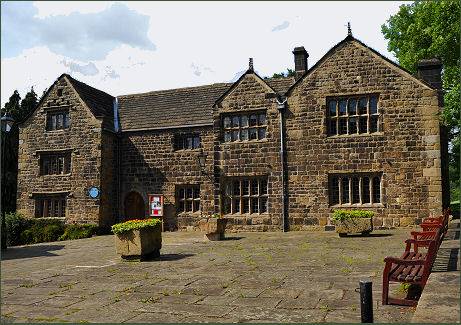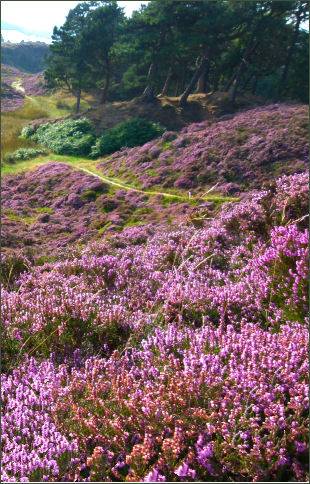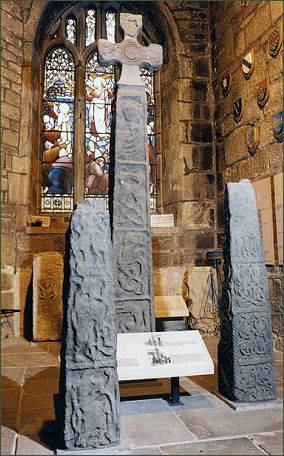Ilkley
OS grid reference:- SE 116 477

 The West Yorkshire spa town of Ilkley in Lower Wharfedale lies around 12 miles (19 km) to the north of Bradford and 17 miles (27 km) northwest of Leeds and lies at the southern edge of the beautiful Yorkshire Dales.
The West Yorkshire spa town of Ilkley in Lower Wharfedale lies around 12 miles (19 km) to the north of Bradford and 17 miles (27 km) northwest of Leeds and lies at the southern edge of the beautiful Yorkshire Dales.
Ilkley's heritage as spa town and its highly attractive surrounding landscape make it a popular venue with tourists. The centre of Ilkley features much Victorian architecture and streets bedecked with floral displays.
Beautiful Ilkley Moor (pictured right), to the south of the town, rises to 402 metres (1,319 feet) above sea level, is famous as the inspiration for Yorkshire’s unofficial national anthem 'On Ilkla Moor Baht 'at' and is also a Site of Special Scientific Interest due to its upland habitat for ground-nesting birds. Two rock climbing areas, Rocky Valley and Ilkley Quarry are situated to the north, where the moor drops steeply towards the village of Ben Rhydding. Ilkley Quarry is the site of the famous "Cow and Calf", a large rock formation consisting of an outcrop and boulder, also known as Hangingstone Rocks. Legend states that there was once also a "bull", but that was quarried for stone.
The Domesday Survey of 1086 describes Ilkley as being in the ownership of William de Percy 1st Baron Percy, known as 'Aux Gernons', 'the Bewhiskered', he came over from Normandy during the reign of William the Conqueror, who granted him estates in the north of England..
In the seventeenth and eighteenth centuries the town acquired a reputation for the efficacy of its water and became known as a fashionable spa town in the nineteenth century and people flocked to the town to 'take the waters'. Charles Darwin underwent hydropathic treatment at Wells House at Ilkley when his famous book 'On the Origin of Species' was published in 1859.
The remains of a Roman fort are situated near the town centre, which is believed by a number of authorities to be the fort of Olicana, dating to 79 AD, however this identification is disputed. A number of Roman altars have been unearthed dating to the reigns of Antoninus Pius (138 to 161), and Septimius Severus and his son Caracalla.
 The medieval Manor House Museum (pictured above left), is one of the town's oldest buildings, a local heritage museum, art gallery and education centre was established in the building in 1892 to preserve local archaeological artefacts after the spa town expanded. The museum features prehistoric artefacts and documents the Roman fort of Olicana - remains of which may be seen at the back of the building, as well as the rise of Ilkley as a spa town. Admission to the Museum is free. Ilkley Toy Museum has a collection of toys dating from 350 BC and a collection of wooden dolls.
The medieval Manor House Museum (pictured above left), is one of the town's oldest buildings, a local heritage museum, art gallery and education centre was established in the building in 1892 to preserve local archaeological artefacts after the spa town expanded. The museum features prehistoric artefacts and documents the Roman fort of Olicana - remains of which may be seen at the back of the building, as well as the rise of Ilkley as a spa town. Admission to the Museum is free. Ilkley Toy Museum has a collection of toys dating from 350 BC and a collection of wooden dolls.
lkley is now a shopping town, the Victorian parades of the Grove and Brook Street feature a selection of speciality shops. The town's original Victorian arcade has been restored as an indoor shopping walkway.
Bettys, the Yorkshire tea room, also has a shop in the town. The bright and welcoming tea room is lit by attractive stained glass windows and decorated with a collection of quirky antique teapots.
There are numerous small independent shops, including Lishman's of Ilkley, one of Britain's finest butchers selling award-winning pies and sausage. The Michelin-starred Box Tree restaurant is where Marco Pierre White trained.
Ilkley's medieval parish church All Saints' stands on the site of the ancient Roman fort of Olicana. Although parts of the present church date back to the Norman era it was largely reconstructed in the Victorian period. The site has been occupied by a place for Christian worship since 627 AD.
The building houses artefacts relating to the site's ancient Christian heritage including three Saxon crosses (pictured left), which date to the eighth century, they once stood in the churchyard but are now displayed inside the tower to prevent erosion.
Darwin Gardens, to the south of the town, is a Millennium Green which commemorates the town's links with English naturalist Charles Darwin, who stayed there during the publication of his famous "The Origin of Species". The Green features a maze, whose design was influenced by the Swastika Stone carving on Ilkley Moor, and includes monuments with an evolutionary theme. Other attractions include the Victorian bath house and the recently refurbished Ilkley Pool and Lido, one of the country's last remaining outdoor public swimming pools.
Towns and Villages of Yorkshire
